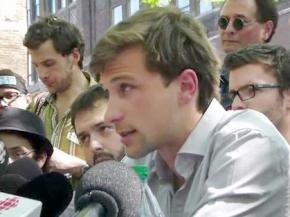Quebec government abandons negotiations
After months of stonewalling students on strike across Quebec, the government walked out on negotiations, writes Canadian socialist .
"NOTHING IS working anymore in Quebec City." So began the report on Radio Canada (French-language CBC) about the collapse of negotiations between the Quebec government and the four associations of post-secondary students on strike. Around 4 p.m. last Thursday, May 31, Minister of Education Michelle Courchesne walked out of the talks.
Both sides held press conferences following the collapse. The government explained that the sole, effective offer it made (varying only in form) over the four days of talks was to reduce its proposed hike in tuition fees by $35 to $219 for each of the coming seven years, and to also reduce proportionately tax credits available to students and their families.
The last of a series of counter-proposals by student representatives was a freeze on tuition fees for two years and a reduction in tax credits such that the government would recuperate the funds it sought to obtain from its tuition hike.
Student leaders charge that the government's stonewalling was guided by its eye on an election which must take place within 18 months. They cited, in particular, the annoyance expressed by Courchesne, during talks on the fourth day, about newspaper headlines the previous day claiming the government was "folding" from its hardline stance of maintaining its tuition hike at all costs.

What's more, said Gabriel Nadeau-Dubois of CLASSE, the largest of the student association involved in the strike, the fee hike is not a measure to finance colleges and universities, "but a goal in itself, a partisan objective."
This would also explain the government's refusal in negotiations to entertain withdrawing its draconian Bill 78, notwithstanding the tidal wave of opposition to the law, including from the province's bar association.
Nadeau-Dubois launched an appeal to students to deliver a message to the government in the streets. He told Radio Canada, "When a government cuts off dialogue, when a government sabotages negotiations, the only place left for the population to make itself heard is in the streets. And there's where we are returning. For this reason, we are calling for a big demonstration this coming Saturday, June 2, at 2 p.m. at Parc Jeanne Mance. We want people to bring their pots and pans so we can be heard all the way to Quebec City."
As this story was being written on May 31, it was already an evening of noisy protest throughout Quebec, in dozens of cities and towns. In Montreal alone, there were several dozen actions taking place, the largest of which, according to Radio Canada, gathered more than 10,000 people (all, let us note, in defiance of Bill 78 and municipal regulations that restrict the right to protest). In Quebec City, police have moved on a large protest and arrested participants, declaring their march "illegal" under a municipal regulation.
NEWS REPORTS made much hay of Minister Courschene's claim that during the course of negotiations, a representative of CLASSE "threatened" a disruption of the Grand Prix auto race due to take place in Montreal in two weeks. Capitalist interests in the lucrative tourism industry in Quebec are expressing increasing unease with the student protest because it may discourage tourists from coming to the province this summer.
Nadeau-Dubois replied by saying that CLASSE would not prevent people from participating in large sporting or cultural events this summer such as the Grand Prix, but it would make use of large events as "tribunes" to put across its message.
He also spoke of the importance of the growing solidarity actions taking place elsewhere in Canada and internationally. May 30 was a day of "pots and pans" solidarity action in some 30 towns and cities in English-speaking Canada, including in Toronto and Vancouver where some 2,500 and 600 people, respectively, marched.
The French language public broadcaster in Canada spoke to a journalist who explained the two visions of society are at stake here–on the one hand, a student movement that is dedicated to such societal imperatives as public education, public health care and respect for the natural environment; on the other hand, a government that is imposing a "user pay" principle on all social services, all the while reducing taxes and regulations on the capitalist 1 percent and proudly signaling to them, "Enrich yourselves!"
That's the stark choice that will now be fought out in the streets and institutions of Quebec and Canada in the months to come.
There seems little doubt that just as in Quebec, so too across Canada, we are in for a rising popular movement, demanding not only quality education but a different vision for society than the destructive, dog-eat-dog model of the country's present rulers.
First published at RogerAnnis.com.


